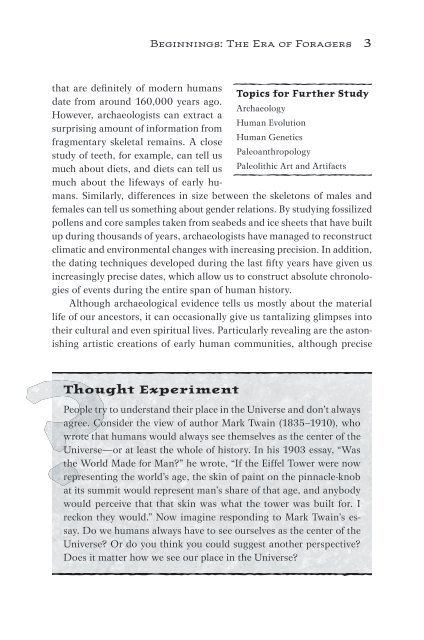This Fleeting World
This Fleeting World
This Fleeting World
You also want an ePaper? Increase the reach of your titles
YUMPU automatically turns print PDFs into web optimized ePapers that Google loves.
Beginnings: The Era of Foragers <br />
that are definitely of modern humans<br />
Topics for Further Study<br />
date from around 160,000 years ago.<br />
Archaeology<br />
However, archaeologists can extract a<br />
Human Evolution<br />
surprising amount of information from<br />
Human Genetics<br />
fragmentary skeletal remains. A close<br />
study of teeth, for example, can tell us<br />
Paleoanthropology<br />
much about diets, and diets can tell us Paleolithic Art and Artifacts<br />
much about the lifeways of early humans.<br />
Similarly, differences in size between the skeletons of males and<br />
females can tell us something about gender relations. By studying fossilized<br />
pollens and core samples taken from seabeds and ice sheets that have built<br />
up during thousands of years, archaeologists have managed to reconstruct<br />
climatic and environmental changes with increasing precision. In addition,<br />
the dating techniques developed during the last fifty years have given us<br />
increasingly precise dates, which allow us to construct absolute chronologies<br />
of events during the entire span of human history.<br />
Although archaeological evidence tells us mostly about the material<br />
life of our ancestors, it can occasionally give us tantalizing glimpses into<br />
their cultural and even spiritual lives. Particularly revealing are the astonishing<br />
artistic creations of early human communities, although precise<br />
Thought Experiment<br />
People try to understand their place in the Universe and don’t always<br />
agree. Consider the view of author Mark Twain (1835–1910), who<br />
wrote that humans would always see themselves as the center of the<br />
Universe—or at least the whole of history. In his 1903 essay, “Was<br />
the <strong>World</strong> Made for Man?” he wrote, “If the Eiffel Tower were now<br />
representing the world’s age, the skin of paint on the pinnacle-knob<br />
at its summit would represent man’s share of that age, and anybody<br />
would perceive that that skin was what the tower was built for. I<br />
reckon they would.” Now imagine responding to Mark Twain’s essay.<br />
Do we humans always have to see ourselves as the center of the<br />
Universe? Or do you think you could suggest another perspective?<br />
Does it matter how we see our place in the Universe?


